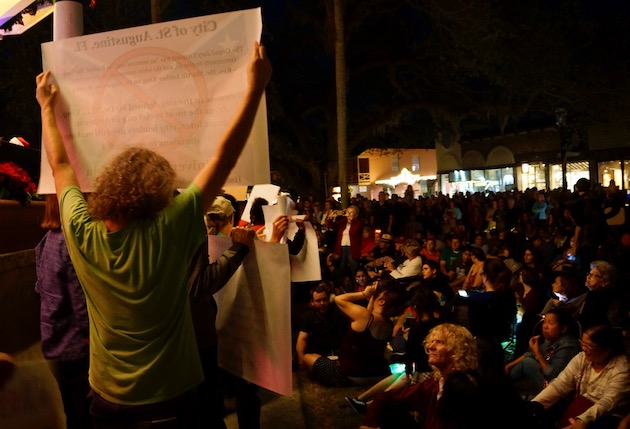By Katie Garwood | gargoyle@flagler.edu
Update: Tuesday, Nov. 13 at 7 p.m.
St. Augustine city commissioners voted Tuesday to approve an ordinance that would bar protest and counter protest participants from entering the Plaza de la Constitución, requiring them to remain on the plaza’s perimeter sidewalks.
The commissioners voted the same way they did several weeks ago at the ordinance’s first reading. Vice Mayor Todd Neville, who voted “no,” did so because the timing of the ordinance’s proposal. On Saturday, Rev. Ron Rawls will lead a protest in the Plaza de la Constitución, calling to tear down the Confederate monument that sits in the plaza.
In response, City Attorney Isabelle Lopez said the ordinance had been in the works for months, and after research and rewriting, it was completed and ready for the commission to vote on in October. She reiterated that the ordinance’s purpose was to keep protesters safe, not to silence them.
Mayor Nancy Shaver supported the ordinance, saying her first priority as a commissioner is to ensure the safety of the city, and to do so, the ordinance was a necessity.
All but one of around 10 who spoke during time for public comment opposed the ordinance. Speakers cited the ordinance was a breach of First Amendment rights and targeted specific protest groups, such as those led by Rev. Rawls.
_________________________________________________________________________
Original story: Monday, Oct. 22 at 9:30 p.m.
A city ordinance that would require “protest and counter-protest participants” to remain on the perimeter sidewalks in the Plaza de la Constitución and allow participants to be “lawfully separated from each other by law enforcement personnel” was sent to a second reading at Monday night’s commission meeting.
The final ordinance will be voted on at a later meeting.
The definition of a protest and how many people are required to be in attendance for it to be a protest were among the elements of the ordinance that commissioners asked to be clarified, and subsequently sent the ordinance to second reading.
Mayor Nancy Shaver and commissioners Roxanne Horvath and Leanna Freeman voted yes, while Vice Mayor Todd Neville and commissioner Nancy Sikes-Kline voted against the second reading. Sikes-Kline rose concerns that the ordinance infringed upon First Amendment rights.
City attorney Isabelle Lopez said the intent behind the creation of the ordinance was to ensure all parties involved in protest were safe, their message isn’t silenced and those attending events in the plaza aren’t insulated from the protestors’ messages. Essentially, the ordinance is a line of protection against uprisings similar to those seen in Charlottesville, Virginia last year.
“If you as government and police do nothing and allow a group whose views may be very radical and whose behavior may incite a very passionate counter reaction, if you do nothing, and that group who holds very unpopular views in the midst of this festival gets attacked, then you have failed in protecting their first amendment rights,” Lopez said.
Around 10 people spoke during time for public comment. The majority of speakers spoke against passing the ordinance, some citing a lack of violence in past protests to require such legislation. Others noted the ordinance suppressed first amendment rights. The Rev. Ron Rawls said in public comment the ordinance’s creation was rooted in racism and designed to curb his efforts to remove Confederate monuments in the city.
“These are my interpretations of the message being sent with this ordinance by the St. Augustine city manager and the chief of police,” Rawls said. “This is our city, would that n—-r just shut up. This our city, I wish that n—-r would just go away. This is our city, that n—-r makes us feel uncomfortable. This is our city, that n—-r needs to get over it. This is our city, who does that n—- think he is. This is our city, we are going to violate that n—-r’s first amendment constitutional right and create an ordinance to put that n—-r in his place.
“Mayor, city commission, this is your city. What are you going to do with this ordinance created to shackle that n—-r you love to hate? You have an opportunity to stop this white supremacy … The only thing you can’t do is silence this black man’s voice.”
Prior to the meeting on his Facebook page, Rawls said the ordinance was a violation of the First Amendment, and if the city passes it, he plans to sue the city.
Ed Slavin spoke in favor of the ordinance, but proposed a few improvements to be made.
“I think it’s a valid, constitutional regulation of time, place, and manner under the first amendment,” Slavin said, adding the term “protest” could be more tightly defined in the ordinance.
Christine Hatfield said the ordinance is “invalid” if it is “unnecessarily burdensome” and prevents a party from communicating a message or is “selectively enforced.”
“At the end of the day, this board and this mayor have brought this upon themselves,” Hatfield said. “Had you done the right thing and removed the statues, or at least the Loring statue, we might not be here today.”



Be the first to comment on "Commissioners approve plaza protest ordinance 3-2"